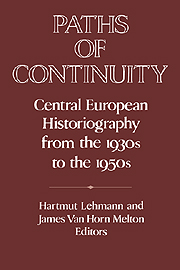Book contents
- Frontmatter
- Introduction: Continuities in German Historical Scholarship, 1933-1960
- 1 German Historiography from the 1930s to the 1950s
- 2 Friedrich Meinecke (1862-1954)
- 3 Change and Continuity in German Historiography from 1933 into the Early 1950s: Gerhard Ritter (1888-1967)
- 4 Hans Rothfels (1891-1976)
- 5 Franz Schnabel (1887-1966)
- 6 Heinrich Ritter von Srbik (1878-1951)
- 7 “Historical Social Science” and Political Myth: Hans Freyer (1887-1969) and the Genealogy of Social History in West Germany
- 8 Some Observations on the Work of Hermann Aubin (1885-1969)
- 9 From Folk History to Structural History: Otto Brunner (1898-1982) and the Radical-Conservative Roots of German Social History
- 10 Werner Conze (1910-1986): The Measure of History and the Historian's Measures
- 11 Continuity, Innovation, and Self-Reflection in Late Historicism: Theodor Schieder (1908-1984)
- Index
8 - Some Observations on the Work of Hermann Aubin (1885-1969)
Published online by Cambridge University Press: 05 January 2013
- Frontmatter
- Introduction: Continuities in German Historical Scholarship, 1933-1960
- 1 German Historiography from the 1930s to the 1950s
- 2 Friedrich Meinecke (1862-1954)
- 3 Change and Continuity in German Historiography from 1933 into the Early 1950s: Gerhard Ritter (1888-1967)
- 4 Hans Rothfels (1891-1976)
- 5 Franz Schnabel (1887-1966)
- 6 Heinrich Ritter von Srbik (1878-1951)
- 7 “Historical Social Science” and Political Myth: Hans Freyer (1887-1969) and the Genealogy of Social History in West Germany
- 8 Some Observations on the Work of Hermann Aubin (1885-1969)
- 9 From Folk History to Structural History: Otto Brunner (1898-1982) and the Radical-Conservative Roots of German Social History
- 10 Werner Conze (1910-1986): The Measure of History and the Historian's Measures
- 11 Continuity, Innovation, and Self-Reflection in Late Historicism: Theodor Schieder (1908-1984)
- Index
Summary
La sociologie est une histoire pretendue reformée. Partout ou Vhistoire est incertaine, automatiquement et de la même incertitude la sociologie est incertaine.
Charles Peguy, Cahiers, VIII-3, 4.II. 1906I come to this conference and to my particular subject as an outsider, and this in two ways. First, I am a specialist neither of German history nor more particularly of its historiography. I shall, perforce, approach my topic from a somewhat different, not exclusively German-centered perspective, in a different “discours.” I hope this will serve to broaden our perspective here, as well as to enhance the relevance of our discussions. Second, I confess that when Professor Melton invited me to comment on Professor Michael Burleigh's essay with Hermann Aubin as its subject, Hermann Aubin was but a name to me - a name vaguely associated with the history of German settlements in Eastern Europe, with all the negative implications this topic has for a historian of pre-revolutionary Russia. Since then I have tried to fill this blank spot in my knowledge by assiduously reading Aubin's works in the time available before the conference; needless to say, I have only been able to get superficially acquainted with them. I am, therefore, particularly distressed that circumstances prevented Professor Burleigh from submitting his essay, for it would have been a most valuable crutch.
- Type
- Chapter
- Information
- Paths of ContinuityCentral European Historiography from the 1930s to the 1950s, pp. 239 - 262Publisher: Cambridge University PressPrint publication year: 1994



